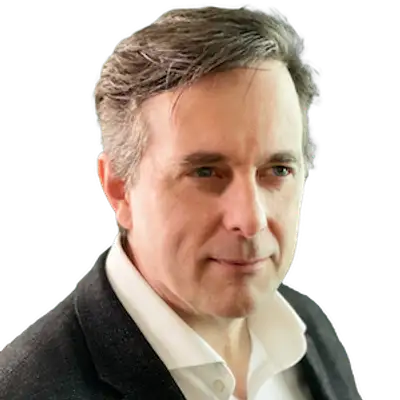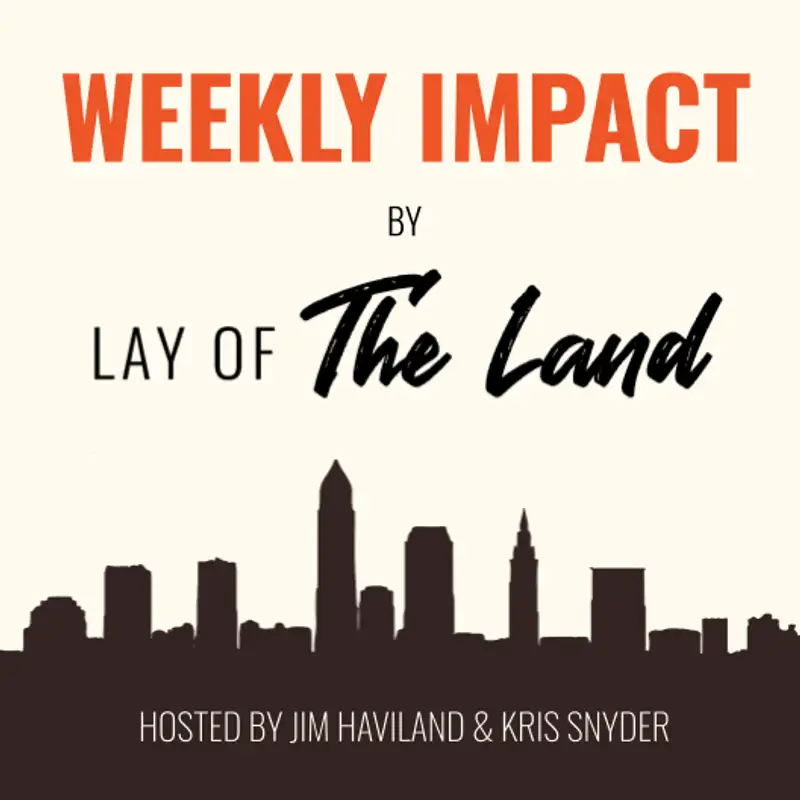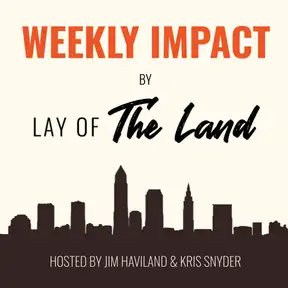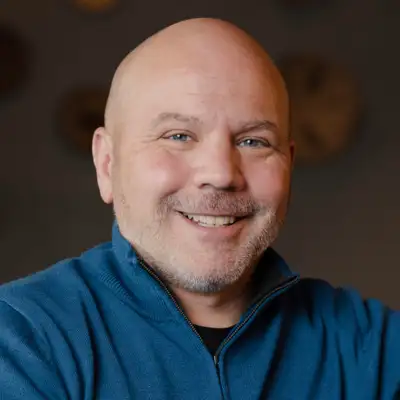9-3-24 Fred DiSanto of Ancora, Annual Planning, Don't Wait
Jim Haviland (00:01.208)
Hello, everyone. This is Weekly Impact by Lay of the Land. This is the third of September, twenty -twenty -four. I'm Jim Haviland. Mr. Snyder, how are you today?
Kris Snyder (00:09.037)
and I'm Kris Snyder.
I'm doing well, Jim. How about yourself?
Jim Haviland (00:14.22)
I'm doing all right. We are clearly in pumpkin spice territory here. It got chilly today. I wore a jacket today in the office. It was a little bit chilly there. actually, got to mark down two tenths just because how cold it was in the boardroom.
Kris Snyder (00:20.378)
Ha
Kris Snyder (00:29.726)
wow, it takes those big buildings a while for the HVAC to catch up in either direction, hot or cold.
Jim Haviland (00:36.014)
Yeah, I don't know what that is. We put a man on the moon or whatever. OK. So, Kris, we're talking today, we have a couple of things to cover. We had a great episode, Fred DiSanto of Ancora, number 181, for those of you playing the home game. And this was a really great conversation about something that's not really the like I'm building something brand new entrepreneurial, but certainly full of all the entrepreneurial stuff that makes for someone who builds.
great companies. many great lessons in this one, don't think?
Kris Snyder (01:07.652)
Yeah, there's just wisdom from Fred, right? Like I think you get wisdom through years of experience if we're lucky enough to pay attention to the learning. And he's clearly.
Jim Haviland (01:10.029)
Yeah.
Jim Haviland (01:13.824)
Yes. As Jeffrey likes to say, earned wisdom, which I like.
Kris Snyder (01:19.254)
Yeah. I think he's, he's earned a little bit of wisdom along the way. I think from the different organizations, you know, you know, being kind of gritty at times is the way he, would say he described it, right? He's paying attention, but there's definitely lots of, of it's not easily given, right? You got to go out and get it. And even one of the interesting parts he talked about was, you know, connecting the dots. And I know one thing that we have in common with that is like, we, believe in, you know,
trusted high valued relationships in the way in which you get those often is from, you know, someone extending trust from one person to the next, right? And doing that trusted introduction of value. And that's how we start to get there. And it's not about the volume game as much as about like, you know, who genuinely needs to meet somebody else. And I did enjoy his moments, like you do it without expectation.
Jim Haviland (02:08.136)
expectations. if you want, if you're looking for something to get back, you're doing it wrong. Yeah.
Kris Snyder (02:12.088)
Yeah, but I think the get back, this is my only addition to that, would be the get back as community. I expect that if we all go into it and then we think that part of our obligation opportunity to improve is to expand our community, the community is connected, that people know each other. And you can say, I have a person for that that can help you today. We're experiencing that.
Jim Haviland (02:33.91)
Yeah. And it's one of the great, mean, it occurred to me as I listening to that, that, I do, I got a bunch of clients in LA. I've had a bunch of Chicago in DC, in New York, and the problem with those really big markets, the great thing is there's, you know, lots of opportunity, but there, you can't wrap your arms around the community in any particular way. So, you know, if you aren't finding the place to fit in yet, you've got, you have Ingo for a long time without finding your peeps, without finding your tribe. And I think,
It's much easier and we, because we value it so much more and you can get to your tribe here and find, you know, that the action of that tribe much easier than you can in a giant market. I think Fred Talk spoke that as well, that you can, you know, you can write someone a note here and it has an impact.
Kris Snyder (03:20.504)
Yeah. Well, we're still discovering our circles, right? Like it's pretty interesting. You can meet somebody and then it's whatever degrees of separation. And you're like, wow, we probably could have bumped into each other at any moment in time because of all the overlap that's out there. And if someone just had great software for it, Jim, that would be awesome wouldn't it?
Jim Haviland (03:22.094)
which is just.
Jim Haviland (03:26.434)
Yes.
Jim Haviland (03:45.009)
That's foreshadowing my friends. Yes. So I think that's right, Kris, if only someone had great software for that. And just an example, I won't call her out yet, but a new founder that we hadn't met, that hasn't been in our circles for a while, Jeffrey introduced me to her over the weekend. We're meeting next week, but she introduced me to something that a guy named Bob Sapko that you and I both know who's
He's been on the show and has done great work at Case, but he's been sending out this list of great opportunities. I'll put that in the show notes for people to start to learn entrepreneurship. Students have been part of this, his world forever. So what are the opportunities that students can be going after? I think it's bringing those things together. I would love to support that kind of stuff. I just didn't know that that was going on.
Kris Snyder (04:11.684)
winner.
Jim Haviland (04:38.694)
I think there's more work to be done for sure. We haven't wrapped our arms around Cleveland yet, but we're working on it.
Kris Snyder (04:43.726)
Well, and that's probably mentorship, I think is one of the highlights of the show too, right? And I think people will have different varying opinions on it. I'm a huge fan. think it's almost like, you you go, you go do it because someone did it for you. And I was fortunate enough to have, and continue to have mentors that, you know, so feel compelled when others, then there's our opportunities. think EO, Entrepreneurship Organization here in Cleveland has a great, has a great mentorship program.
Jim Haviland (05:09.664)
Right. Yeah. I think, you know, for me, I know that it is part of our coaching program. I learned so much by teaching the things that I know. And it gives me moments of reflection that are so invaluable when I go through something with somebody and say, Hey, here's how, you know, in my experience, is how you should best go do it. And actually it's one of the impact moments today in a session I had where someone's called out, you know what? I know everything you always tell us, but we fall away from it and I need to hear it again. It's like, and I.
I said, I feel exactly the same way. As I'm saying it to you, I know that I'm learning it too about how to have a time box and how to make sure I'm being clear with my expectations and how to make sure that I'm becoming a better and better leader, the leader that this team needs, right? Those are all things that we need to hear again and again. And, you know, having mentors and people around you that you can turn on to or turn to to help you with that is important.
Kris Snyder (06:04.878)
Well, did you just switch gears to impact moments? Is that what just happened?
Jim Haviland (06:08.483)
I did by accident. moved to impact moments. So had that moment today. If you have anything you want to share with us.
Kris Snyder (06:15.684)
Yeah, think mine was a session last week and sometimes you just don't know what you don't know because you haven't seen as much as we've got to see fortunately through all the coaching. But normally when you start this work of a business operating system and you start to make the change, you're going to be flying the plane and fixing it at the same time. You don't get to pull over. You don't get to stop the business is already running. Right. I think that it's a
I think for people who haven't been there before, they think there's probably a different way to do it. And it's like, look, no, it's just going to be hard. It's just going to be messy. We're not going to have all the answers, but all the time I've been doing this for the last five years, no one ever said they wish they would have waited longer. They typically realize.
Jim Haviland (06:55.562)
Never, never, never. And they always say, gosh, you know, I know I said I was worried about this and this and this, how this would get in the way of that. I was, that was not the right thinking because it's like, you know, I'm not going to tell you, can't think the way you think. You know, I don't know. I don't have, I can't guarantee you success if you follow my process. can tell you that everyone that does follow the process that we teach does reach more success if you actually follow it. And the thing is you're going to have to solve these problems regardless.
It isn't like you get away from it, but I'm just putting a wrapper on it. I'm showing you exactly what the future looks like as opposed to you trying to, you know, feel your way towards it all by yourself. And that's really, I think, the end of being the difference.
Kris Snyder (07:39.32)
Yeah, and the difference is most of us can follow up a playbook, right? Why put energy and effort and trying to figure out that, right? Just follow it, right? Now the discipline then has extra energy to go to things that are hard and that's changing behaviors hard, right? Showing up to meetings on time, the same time, the same week, the same day, right? Like those types of things are hard.
Jim Haviland (07:45.474)
Yes.
Jim Haviland (08:01.346)
Well, and I had a similar set of experiences recently. One of them where the leader's being exited by the owner, where it was, I just couldn't get the leader to really embrace the whole system. They thought they had to come up with their own stuff. They felt like I was showing them to be a weaker leader by showing them there's a path outside of what they already knew to go do. then, so they kept kind of put their own stuff in. keep, you know, like, hey, I'm going to do
5 % of what you're doing and 10 % of this and 15 % of that, because that way I own it. And I think that the way I've heard a phrase best, this is a Brene Brown thing. You have to be, the best leaders are the ones that are focused on getting it right, not knowing it. So are you focused on you being right or making it right? And I think that's, ultimately there's no way for you to know everything that's going on. There's just no way to know all the possible ways. There's no way for you to know the best way.
Kris Snyder (08:44.431)
Yeah.
Jim Haviland (08:58.626)
You have to make decisions, but it's going to be clearer if you follow a process and focus on that. Put your attention to that, not in coming up with your own framework for these things. There's no upside to it. You're never going to have the visibility cross, I don't know, how many companies do we think are running EOS and scaling up and like hundreds of thousands at this point? How could you possibly have enough visibility to make them up with a better plan than that? I don't get it.
Kris Snyder (09:16.974)
gotta be. Yeah.
Kris Snyder (09:24.927)
Well, I think that's why Jim Collins had five levels of leaders, right? Level five leader. And it's typically the difference between four and five is that it's a humble moment, right? And being able to be comfortable and just admit the things you don't know, right? Versus trying to remind everyone of all your achievements and all your success in defense of what you don't know.
Jim Haviland (09:32.875)
Right. Right.
Jim Haviland (09:39.81)
Right.
Jim Haviland (09:52.122)
It's someone told me a long time ago and I hold onto this like the really the smartest leaders are the ones that are never afraid to ask a question. They're not going to pretend they're supposed to know this. just they remain curious and knowing that, tell me about that. I don't know anything about that. it's like that's not a big deal. I couldn't possibly know everything. I'm not here to know everything. I'm here to decide like which way we're going to go. And I don't have to be right. I just have to get us moving.
Kris Snyder (10:13.677)
Yeah.
Jim Haviland (10:20.43)
Because chances are you get two or three choices. No one is going to be perfect. You're still going to have to fix the plane while it's in flight to get there. But deciding today, that's your lucky day, the day you decide. that's, well, good. I think it's a great impact moment. there's never a point in waiting, folks, just to clear, put a sharp edge on it. There's no point in waiting. Make a good decision and keep going forward. And a good decision is one you're going to do confidently.
Kris Snyder (10:28.099)
That's right.
Kris Snyder (10:41.124)
Nope.
Jim Haviland (10:49.398)
It's, it can't promise you're going to be right, man, but just keep moving forward because the waiting is the death knell. It is one of the, it's one of the seven deadly sins of the entrepreneur. Another foreshadowing moment. All right, Kris, the last thing I want to talk about today is annual session. So we're in September. I actually had my first annual session back in, you know, back in the beginning of August. That doesn't really count, but we are clearly in annual season. So let's talk about what that means and what we know.
about annuals because everyone listening to our voices should be planning an annual planning session regardless of what they're doing as far as an operating system.
Kris Snyder (11:28.014)
Yeah, and there's a cadence to it, right? We typically would coach this to say, you're going to have, you know, obviously four quarters and that work every quarter is a reflection on the previous quarter and then they'll look forward, right? But that's operating from a plan, an annual plan. And that annual plan gets set once a year, gets checked in on the other three quarters, but it gets set once a year. And we want to free up space and time as a leadership team and do some team health exercises, right? Get to know each other a little bit better. You probably have had...
one or two or more newer leaders from this last year. And that is a moment in time to get to know each other such that we can be better versions of self together. Right. So we'll do some team health. We love Five Dysfunctions of Team by Patrick Lencioni He's obviously a book that's extremely well known. There's a bunch of other like strength finders and whatnot you can plug into this just to get good team health. And then you do want to like give yourself space and grace to do strategy work. You know, there's all kinds of great tools out there.
like the SWOT tools, a really good one, right, to do that. And then how you think of, how far out can you see the three, the five, 10, right? Like, let's go check in on those again and how we're documenting, how we're bringing them together. And I think that day is often discounted depending upon the stage of development the company's in. So I totally get, if you're in stage one survival, you're probably not even having quarterlies right now. You're just still getting through, getting by. We would encourage you to start to try to get there, right?
Jim Haviland (12:49.452)
Yeah.
Kris Snyder (12:51.812)
put together what you can in while you're in survival. And that's often just the founder, right? That's putting notes together about what they think the plan for the year is gonna be, but do as much as you can. I think we really start to see a pickup when you get to stage two and you really got that sustainable. Cause now I have some more freedom of head space, right? To think about.
Jim Haviland (13:09.85)
And part of what I included in this, Kris, is that, so first of all, when I'm teaching, with First OS, and we're doing the people in that survival mode, I talk about a half -day quarter, at Like, you just need to make objectives for the quarter, things you're gonna go work on. You do have to rise up for a moment, look 90 days out, no longer than that. And sometimes I say, how desperate you are, maybe it's 30 days. Like, every month you're gonna do a little time where you're looking at what you're doing, you're all agreeing what's the most important things, and...
Kris Snyder (13:23.439)
Yeah.
Jim Haviland (13:37.582)
that agreement's most important part, and then working on it. And sometimes you've got to rise up a little bit longer and say, okay, where's this going out to? Because that's going to be your input for figuring out what your 90 -day goals are. And part of the cadence of the annual is that most of the companies, they're relatively small that we're talking to, you don't have time to be thinking about a year from now or three years from now or SWOT, any other time. But once a year, you should be able to think about this. And if you get to the place where you're higher up,
I tell the story all the time about Jeff Bezos and when he started out, I was in Seattle when he was starting out and I know that at the end of the day, if they weren't going to make shipping, he'd go down to the warehouse and help out. But by the time he left, he spent all his time in that forward motion mode. He was constantly thinking about what can we do for this business five to 30 years out? And that's what he was thinking. And you earned the right for that. When you're one of the biggest companies on the planet, yeah.
Kris Snyder (14:25.113)
Yeah.
Jim Haviland (14:34.296)
You're going to have a handful of people that do nothing, but think about the full, you know, but as you grow, can be more and more time in that, in that forward motion, in that, that long -term goal. When you're in the, these relatively, these lower places on, on that totem pole, we need you to spend a little time thinking about full thinking forward. So you're building trust, meaningful trust. So you're, you're acting better as a team and you can get together and agree and align on some longer term goals. And cause it's part of learning.
to make good predictions, learning to make good plans.
Kris Snyder (15:07.79)
Yeah, no, that's one of the things that you want leaders to do as you talked about deciding earlier, right? It's the ability to synthesize the data and say, are the markers that tell me patterns are changing? And if the patterns are changing, I've got to get in front of it, right?
Jim Haviland (15:13.229)
Yeah.
Jim Haviland (15:21.387)
And the recursive nature of this like, we got that one wrong, but like we learned something in the process of getting it wrong. That is part of being humble enough to realize, look at that. We didn't get that one right, but now we know this and now we can make a better plan. And that's just the work to be done, Kris. Just the work to be done.
Kris Snyder (15:38.202)
It is a forever work.
Jim Haviland (15:39.616)
All right. Well, good. So I'll put some resources that we have for annual planning in the show notes as well, Kris. Anything else we got to cover today?
Kris Snyder (15:47.502)
I think that's our weekend review.
Jim Haviland (15:49.888)
All right, fair enough. Everyone have a high impact week, man. Kris, you too. We'll see you next week. All right, bye now.
Kris Snyder (15:54.372)
See you next week. Thanks. Bye.
Creators and Guests



